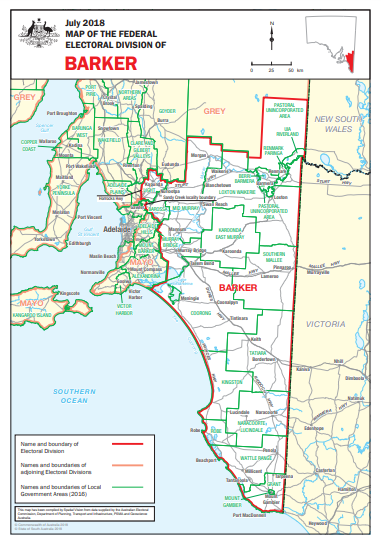|
|
|
|
| Adam Carr's Election Archive
|
Australian federal election, 2022
Division of Barker, South Australia
Named for: Captain Collet Barker (1784-1831), explorer of the mouth
of the Murray
South-eastern SA: Mount Gambier, Murray Bridge, Renmark, Tanunda, Waikerie
State seats: All of
Mount Gambier and
Mackillop, parts of
Chaffee,
Hammond,
Schubert and
Stuart
Local government areas: All of
Berri-Barmera,
Coorong,
Grant,
Karoonda-East Murray,
Kingston,
Loxton-Waikerie,
Mid Murray,
Mount Gambier,
Murray Bridge,
Naracoorte-Lucindale,
Robe,
Renmark-Paringa,
Southern Mallee,
Tatiara and
Wattle Range, and parts of
Barossa and
Light
Borders with:
Farrer,
Grey,
Mallee,
Mayo,
Parkes,
Spence and
Wannon
Enrolment at 2019 election: 118,371
Enrolment at 2022 election: 123,518 (+04.4)
1999 republic referendum: No 67.6
2018 same-sex marriage survey: Yes 52.3
Sitting member: Tony Pasin (Liberal):
Elected 2013, 2016, 2019
2007 Liberal majority over Labor: 9.5%
2010 Liberal majority over Labor: 12.9%
2013 Liberal majority over Labor: 16.6%
2016 Liberal majority over NXT: 4.7%
2019 Liberal majority over Labor: 18.9%
Liberal two-party vote 1983-2019
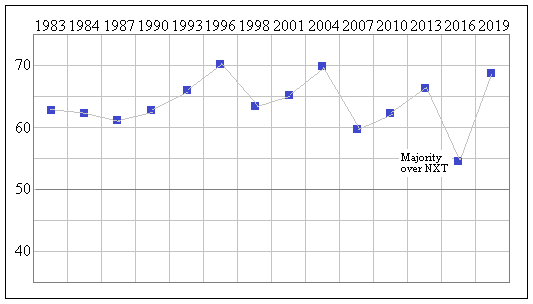
Status: Very safe Liberal
Best Liberal booths, two-party vote: Furner (95.0), Tintinara (93.7), Western Flat (93.3), Peake (91.3),
Frances (88.2)
Best Labor booths, two-party vote: Narung (52.3), Williamstown (46.6), Freeling (44.3), Lyndoch (44.3),
Murray Bridge South (44.2)
2019 results
Statistics and history
Candidates in ballot-paper order:
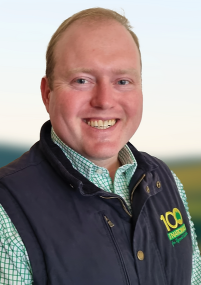 |
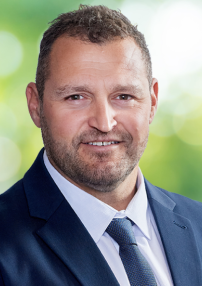 |
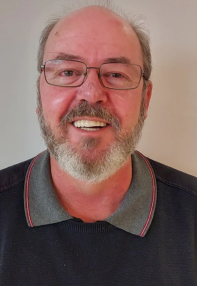 |
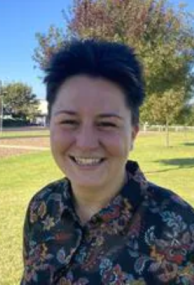 |
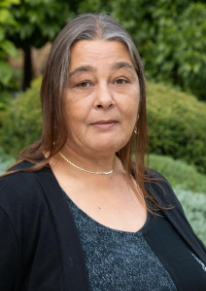 |
1. Jonathan Pietzsch
The Nationals |
2. Carlos Quaremba
Pauline Hanson's One Nation |
3. Vince Pannell
Independent |
4. Maddy Fry
Independent |
5. Rosa Hillam
Australian Greens |
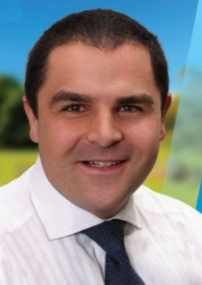 |
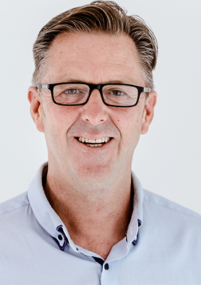 |
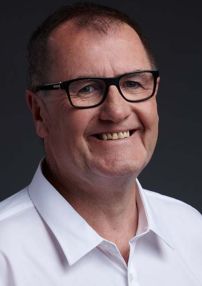 |
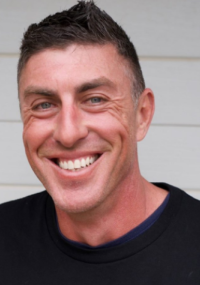 |
6. Tony Pasin
Liberal Party |
7. David Swiggs
United Australia Party |
8. Mark Braes
Australian Labor Party |
9. Kym Hanton
Australian Federation Party |
Candidate websites:
Mark Braes
Kym Hanton
Rosa Hillam
Tony Pasin
Jonathan Pietzsch
David Swiggs
Division of Barker
Barker has existed since South Australia was first divided into electorates in 1903. It has always been a rural
seat occupying the south-eastern corner of South Australia, and is still one of the most heavily agricultural seats
in Australia. Recent redistributions have expanded it northwards to take in the Riverland area, without changing its
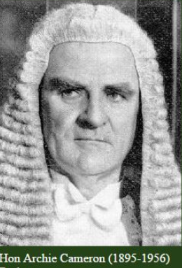 highly conservative political character. It has the usual rural combination of a relatively low weekly family
income level and a low levels of people born in non English speaking countries and people in professional
occupations. (Ten percent claim German ancestry, but they are descendants of 19th century immigrants.)
Barker has one of the lowest levels of university graduates in the country.
highly conservative political character. It has the usual rural combination of a relatively low weekly family
income level and a low levels of people born in non English speaking countries and people in professional
occupations. (Ten percent claim German ancestry, but they are descendants of 19th century immigrants.)
Barker has one of the lowest levels of university graduates in the country.
In 117 years Barker has never elected a Labor member, coming close only in 1943, and no member for Barker has ever
been defeated.
Archie Cameron was Country Party Leader in 1939-40 and later Speaker.
Recent members have included Liberal
ministers Dr
Jim Forbes and
Ian McLachlan, Defence Minister
in the first Howard Government.
Patrick Secker won the seat after McLachlan's retirement in 1998. He was a very
inconspicuous backbencher, and was dumped in 2013.
Tony Pasin, Liberal MP for Barker since 2013, was a Mt Gambier barrister and member of the Mt Gambier City Council
before his election. In 2016 the Xenophon Team candidate came second, sharply cutting Pasin's majority, but with
Nick Xenophon's departure from politics the seat returned to its traditional
Liberal loyalty in 2019. Unless he is dropped by his own party, Pasin will hold this seat as long as he likes. The Labor
candidate is Mark Braes, a former Mayor of Wattle Range Counci. The Greens candidate is
Rosa Hillam, an artist.
Demographics:
Median weekly household income: $1,050 (Australia $1,438)
People over 65: 20.6% (Australia 15.8%)
Indigenous: 2.6% (Australia 2.8%)
Australian born: 81.9% (Australia 66.7%)
Ancestry: German 10.0%
Non-English-speaking households: 6.8% (Australia 22.2%)
Catholics 14.0% (Australia 22.6%)
No religion 34.8% (Australia 29.6%)
University graduates: 8.8% (Australia 22.0%)
Professional and managerial employment: 29.0% (Australia 35.2%)
Employed in manufacturing and construction: 26.5% (Australia 22.9%)
Employed in agriculture: 2.4% (Australia 3.3%)
Paying a mortgage: 32.4% (Australia 34.5%)
Renting: 27.3% (Australia 30.9%)
Traditional families: 25.8% (Australia 32.8%)
Back to main page
|
|
 highly conservative political character. It has the usual rural combination of a relatively low weekly family
income level and a low levels of people born in non English speaking countries and people in professional
occupations. (Ten percent claim German ancestry, but they are descendants of 19th century immigrants.)
Barker has one of the lowest levels of university graduates in the country.
highly conservative political character. It has the usual rural combination of a relatively low weekly family
income level and a low levels of people born in non English speaking countries and people in professional
occupations. (Ten percent claim German ancestry, but they are descendants of 19th century immigrants.)
Barker has one of the lowest levels of university graduates in the country.
